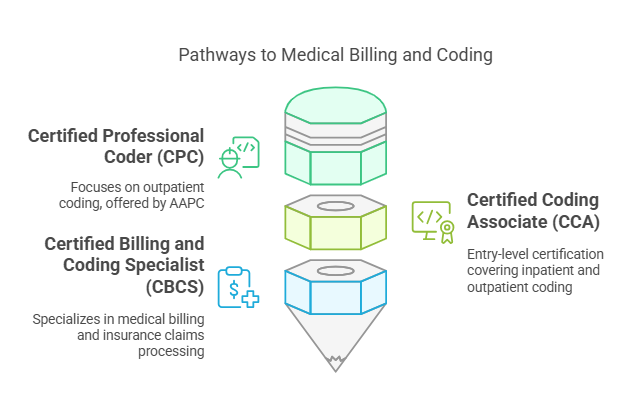Top Programs for Medical Billing and Coding Certification NC
Are you looking to get certified in medical billing and coding in North Carolina? This certification is essential for professionals aiming to work in medical administration and healthcare finance. Medical billers and coders play a vital role in ensuring smooth insurance claims processing and accurate patient record-keeping. With a growing demand for qualified professionals, enrolling in an accredited program is a key step toward a promising career in this field.
This guide provides updated insights into the top certification programs in North Carolina (NC), essential qualifications, certification options, and career prospects for 2025.
Understanding Medical Billing and Coding
Medical billing and coding professionals, especially those with medical billing and coding certification from AMBCI, serve as a crucial link between healthcare providers and insurance companies. Their primary responsibility is to ensure accurate coding of medical diagnoses and procedures, which helps in efficient billing and reimbursement.
Medical coders use coding systems like ICD-10 and CPT to classify medical diagnoses and treatments correctly.
Medical billers handle patient invoicing, insurance claims processing, and payment tracking to ensure timely reimbursements.
With the increasing adoption of electronic health records (EHRs), proficiency in medical coding software and compliance regulations has become essential. Understanding medical terminology and healthcare regulations is key to succeeding in this field.
Education Requirements for Medical Billing and Coding
To enter the medical billing and coding field, a high school diploma or equivalent is the minimum requirement. However, many employers prefer candidates with an associate degree or a professional certification.
Types of Educational Programs:
Certificate Programs (6–12 months) – Focus on medical coding and billing, excluding general education courses.
Associate Degrees (2 years) – A broader curriculum covering healthcare administration, medical ethics, and coding principles.
Online Certification Programs – Flexible, self-paced courses suitable for working professionals.
Many programs emphasize ethical medical coding and fraud prevention, preparing students for compliance with healthcare regulations.
Duration of Training Programs
The time required to complete a medical billing and coding program varies based on the chosen educational path:
Certificate Programs – 6 to 12 months
Associate Degree Programs – 2 years
Professional Certification Preparation – Varies (typically a few months of study before the exam)
Online programs offer flexibility, allowing students to study at their own pace while balancing other commitments.
Key Certifications in Medical Billing and Coding
Obtaining a recognized certification increases job prospects and earning potential. The top certifications in 2025 include:
Certified Professional Coder (CPC) – Offered by AAPC, ideal for those focusing on outpatient coding.
Certified Coding Associate (CCA) – Entry-level certification by AHIMA, covering inpatient and outpatient coding.
Certified Billing and Coding Specialist (CBCS) – Recognized by NHA, focusing on medical billing and insurance claims processing.
To earn these certifications, candidates must pass an exam, often requiring extensive knowledge of medical coding systems, anatomy, and compliance laws.
Top Medical Billing and Coding Certification Programs in NC (2025)
North Carolina offers several reputable programs that prepare students for certification. Here are three top options:
1. North Carolina Central University (NCCU)
Online program covering medical terminology, coding systems, and health insurance processes.
Experienced instructors from the healthcare industry.
Prepares students for CPC, CCA, and CBCS certifications.
2. Wake Technical Community College
100% online, self-paced program.
Covers ICD-10, CPT, and EHR software training.
Flexible scheduling for working professionals.
3. Pitt Community College
Comprehensive curriculum with hands-on coding experience.
Includes medical ethics and compliance training.
Strong job placement assistance for graduates.
These programs ensure students acquire both theoretical knowledge and practical skills required in the medical billing and coding industry.
Career Opportunities and Job Outlook in 2025
The demand for medical billing and coding specialists continues to rise due to an aging population and increased healthcare needs.
Job Growth: The Bureau of Labor Statistics (BLS) projects a 9% job growth rate for medical records and health information technicians from 2023 to 2033.
Salary Expectations: The average annual salary for certified professionals is around $46,500, with top earners making over $65,000.
Work Settings: Professionals can work in hospitals, private clinics, insurance companies, and remote positions.
Certification and experience significantly influence earning potential and career growth opportunities.
Financial Assistance Options for Certification Programs
Many students rely on financial aid to cover tuition costs. Available funding options include:
Federal Grants – Pell Grants and Federal Supplemental Educational Opportunity Grants (FSEOG).
Scholarships – Offered by professional organizations like AAPC and AHIMA.
Workforce Development Programs – State-funded programs providing tuition assistance for healthcare careers.
Employer Tuition Reimbursement – Some healthcare facilities offer tuition assistance for employees pursuing certification.
Filling out the FAFSA application is essential to determine eligibility for federal aid.
Advantages of Online Medical Billing and Coding Courses
Online programs provide several benefits:
✔ Flexible Schedules – Study at your own pace.
✔ No Commute Required – Learn from home.
✔ Access to Industry Tools – Training with electronic health record (EHR) software.
✔ Career Support – Many online programs offer resume-building workshops and job placement assistance.
Online learning ensures accessibility for students across North Carolina, including those in rural areas.
6 Less-Known Facts About Medical Billing and Coding
Remote Work Opportunities: The rise of telehealth services has increased remote work opportunities for certified medical coders. For instance, 247 Medical Billing Services offers remote medical coding positions, reflecting this trend.
en.wikipedia.orgSpecialized Coding Fields: Specializing in areas like oncology, cardiology, or dermatology can lead to higher salaries for medical coders. The demand for specialized coding expertise is highlighted by companies such as 247 Medical Billing Services, which provides tailored billing solutions for various medical specialties.
en.wikipedia.orgAI in Medical Coding: Artificial intelligence is being integrated into coding software to reduce errors and automate tasks. Startups like CodaMetrix are developing AI-driven solutions to automate clinical note analysis and medical coding, enhancing efficiency and accuracy.
businessinsider.comMedical Coding Errors Can Cost Millions: Mistakes in coding can result in significant financial losses for healthcare providers. Clinical Documentation Improvement (CDI) programs aim to address this issue by ensuring accurate and complete documentation, thereby preventing revenue loss.
en.wikipedia.orgGlobal Opportunities: U.S.-certified medical coders can work internationally, especially in countries adopting ICD-10 standards. The global adoption of ICD-10 has opened up international opportunities for certified coders, as highlighted in discussions about health informatics.
en.wikipedia.orgContinuous Learning Is Required: Medical coding regulations frequently update, requiring professionals to renew certifications and stay current. Organizations like the American Health Information Management Association (AHIMA) emphasize the importance of continuous education and certification renewal to maintain compliance and expertise in the field.
en.wikipedia.org
Frequently Asked Questions (FAQs)
-
Medical coding translates diagnoses and procedures into standardized codes, while medical billing processes insurance claims and payments. Both roles work together to ensure healthcare providers get paid correctly.
-
A high school diploma is required, but most employers prefer candidates with a certificate or associate degree in medical billing and coding.
-
Certification programs take 6 to 12 months, while associate degrees require about 2 years. Online courses offer self-paced options for faster completion.
-
The CPC, CCA, and CBCS certifications are the most recognized and widely accepted credentials in the industry.
-
Yes. Federal grants, state scholarships, employer tuition reimbursement, and private loans can help cover program costs.
Conclusion
Medical billing and coding is a thriving career path with excellent job prospects, flexible learning options, and competitive salaries. By enrolling in an accredited program and obtaining certification, you can secure a rewarding career in the healthcare industry.
Ready to start your journey? Explore the top medical billing and coding programs in North Carolina today!




